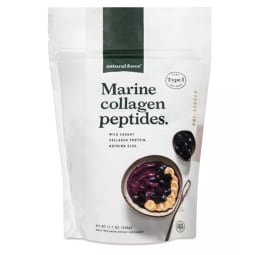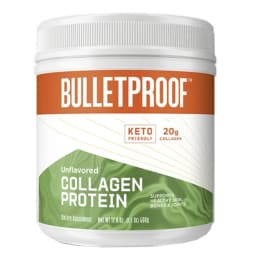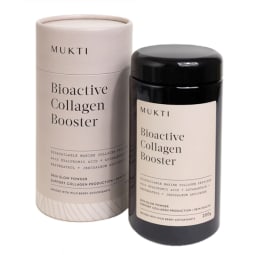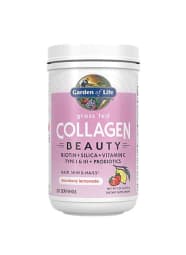The 7 Best Collagen Powders + Dosage, Formats & More



The best collagen powders of 2023
The best collagen powders of 2023
It seems like every time I turn around there's a new collagen "trend" to check out. The supplement has become so popular in the market that it has its own set of spin-offs— lately it's featured in everything from stand alone pills to bottled waters, snacks and the like.
But sometimes it's best to just revisit one of the originals: Collagen powders offer versatile uses, a more flexible dosage, and in some cases, added ingredients to make a more robust formula. (This is why our recommendation will always be to opt for the powder format.)
We've outline our favorite collagen supplements in all formats in this guide, but if you're looking for powders only—you've come to the right place.
What are collagen powders?
First off: Collagen is a family of proteins that are the most abundant proteins in the animal kingdom.
There are at least 28 kinds of collagen (that we know of) that exist, but types I, II, and III are the most common in the human body.
We actually make our own collagen via the cells' fibroblasts—but that production declines with age and other factors. Collagen is perhaps most famous for its role in keeping skin firm and lifted, but it's present in other areas of the body such as the bones, cartilage, and muscle.*
Because collagen is so notable for overall health, many have come to ingest the protein via collagen supplementation.
Collagen supplements are broken down, digestible forms of collagen (derived from things like cows, fish, and chickens) that are capable of being absorbed by the body, traveling to where they can be best used.*
Collagen supplements can come in many forms (liquid, gel, and gummies), but powders tend to be the most ubiquitous on the market.
Collagen powders are exactly as they sound: A powdered format of these peptides that can be added to foods, smoothies, coffee, or even water.
Summary
Benefits of collagen
For a full breakdown of collagen's many benefits for skin, hair, nails, and overall health, check out our guide to collagen supplements.
But as an overview, collagen can help with skin hydration and elasticity, hair health, nail strength, gut support, bone and joint health, and muscle mass.*
- Skin: As illustrated by this systematic review and meta-analysis on collagen and skin aging1, many studies have shown that taking collagen peptides will support skin elasticity, hydration levels, and promote youthful texture.*
- Gut: As a growing area of research for collagen supplementation, there are exciting studies suggesting it can promote optimal gut health. For example, take this two-phase clinical study2, for example, in which 40 healthy women took 20 grams of bovine collagen peptides each day, split into two servings. After eight weeks of collagen supplementation, 93% (13 out of 14 women) of those who completed the study experienced noteworthy improvements in digestion, including bloating and abdominal comfort.*
- Joint, bone, & muscle: Collagen is found naturally throughout the body, meaning it’s benefits are wide reaching. For example, collagen supplements have been shown to promote joint comfort3. As for muscle health, a clinical study found that in addition to resistance training the supplements could help improve body composition4. Finally, in one clinical trial, collagen supplements improved bone density5 in postmenopausal women.*
How we picked:
Expert-informed
The following selects were guided by mindbodygreen’s vice president of scientific affairs Ashley Jordan Ferira, Ph.D., RDN.. In addition, they come tested by the mindbodygreen beauty team & staffers or other beauty experts.
Clean formulas
Less is more when it comes to supplement excipients. Skip artificial colors, flavors, sweeteners, gluten, GMOs, gluten, and known allergens.
Variety
Everyone has unique needs, so we picked options that can speak to a variety of wants, price points, and dietary considerations.
Quality collagen
These are the best of the best, which means the formulas use meaningful and research-informed doses of collagen and are sourced transparently, And in some cases they blend innovative supporting ingredients.
mbg's picks for the best collagen powders of 2023:
Best all-around collagen powder: mindbodygreen beauty and gut collagen+
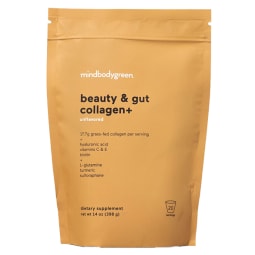
Pros
- Premium collagen plus nutrients, botanicals, and bioactives
- Supports glowing skin, strong hair and nails, and a healthy gut.*
- Sustainably packaged
Cons
- Not vegan (but then again, collagen is never vegan)
Price at time of publish
- $70
Dietary:
Gluten-freeDairy-freeSoy-freeSugar-freeNon-GMOServings per container:
20The one-step beauty routine for a healthy gut, youthful skin, full hair & strong nails. The innovative blend is rooted in its high-potency collagen foundation, delivering 17.7 grams of pasture-raised, grass-fed bovine collagen peptides (delivering types I and III collagen). And this powdered format also has several targeted, powerful ingredients for additional holistic inside-out support. There are vitamins C and E for enhanced collagen production and antioxidant properties, hyaluronic acid for skin hydration, the protein building block L-glutamine, biotin for your beauty needs, and curcumin from turmeric extract and sulforaphane from broccoli seed extract for supporting detoxification and combating oxidative stress. The unflavored option seamlessly blends into whatever dish or drink you choose—and the chocolate variety adds a rich, decadent flavor thanks to the organic cocoa and monk fruit extract.*
Pros
- Sustainably sourced from wild-caught Alaskan cod
- Supports healthy hair, skin, and nails*
- Eco-friendly packaging
Cons
- Only type I collagen peptides
- Only 15 servings
Price at time of publish
- $35
Dietary:
Gluten-freeNon-GMOCertified PaleoCertified KetoServings per container:
15If you follow a pescatarian diet, marine collagen powders are a great way to fold additional collagen into your routine. Always look for peptides sourced from wild-caught sources, like this one, which comes from sustainably sourced cod and nothing else. And if you're worried it might add an unpleasant—or even fishy—taste to your morning smoothie, one review deemed it "tasteless." We also like how transparent this brand is: They break down the amino acid profile, are third-party tested, and are a Certified B Corp.
Best for on-the-go: Vital Proteins Collagen Peptides Powder Supplement Travel Packs

Pros
- Supports healthy skin, hair, nails, and joints*
- Convenient for on-the-go
Cons
- Stick-packs are less eco-friendly
- Not vegan
Dietary:
Gluten-freeDairy-freeWhole30-approvedPaleo-friendlyServings per container:
20While collagen powders are overall the best format for this supplement, one downside that people experience is that bringing a jar or bag of collagen powder isn't always the easiest when traveling. But if you're looking to use your collagen powder while out and about, you can opt for travel packets, like these. (However, we must note individually packed items of any kind aren't the most environmentally responsible options—we recommend limiting their use to only when needed, such as traveling.) The individually portioned containers house Vital's classic blend of 10 grams of bovine collagen that contains 18 amino acids.
Pros
- Flavor variety
- Supports skin hydration*
- Supports joint and bone support*
Cons
- Just collagen, no other bioactives
- Plastic packaging
Price at time of publish
- $45
Dietary:
Gluten-freeKeto-friendlyServings per container:
25While some of the other powders on this list contain other nutrients and bioactives, you'll see nothing but collagen here. This is made with bovine hydrolyzed collagen sourced from pasture-raised cows with no added hormones—and there are 20 grams of it per serving, which makes this a solid source of collagen. If you are someone who is looking for the max amount of collagen—and truly nothing else—this is your best bet.
Pros
- Supports skin firmness & elasticity*
- Supports gut health*
- Features wild berry antioxidants
Cons
- Only delivers 3 grams of collagen
- Not suitable for those with a fish allergy
Price at time of publish
- $99
Dietary:
Non-GMOServings per container:
30Skin care supplements come in many forms with many ingredients to choose from—collagen peptide powders being some of the best. And if you happen to be looking for a collagen-supporting skin care powder, this blend uses 3 grams of marine collagen (which is on the light end) but is bolstered with additional actives to support your skin. There's hyaluronic acid and aloe vera for hydration, astaxanthin for photodamage protection and to protect the collagen layer, and a proprietary super wild berry antioxidant complex to help with oxidative stress.*
Pros
- Features array of beauty-boosting botanicals + probiotics
- Strawberry lemonade flavor (organic flavors)
Cons
- Plastic packaging
- Probiotic strain not specified
Price at time of publish
- $23
Dietary:
Gluten-freeDairy-freeSoy-freeNon-GMOCertified PaleoCertified KetoServings per container:
20If getting healthier hair is as easy and swirling a scoop of powder into your morning drink of choice, sign us up. While the base contains a decent dose of types I and III collagen (12 grams of protein), the stars for the hair are biotin, silica, and vitamin C. Biotin is a main component of keratin production, or the primary protein of hair—research shows that supplementing with the B vitamin can help with hair shedding. It's then layered with vitamin C to help neutralize free radicals (which can lead to aging hair) and silica (which may help strengthen hair and minimize thinning).*
Best flavor variety: Thrive Market Matcha Mint Grass-Fed Collagen Peptides
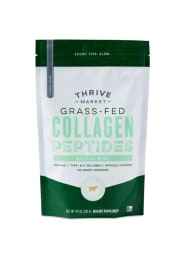
Pros
- Ethically sourced collagen
- Features green tea leaf
Cons
- Only 11 grams of collagen
Price at time of publish
- $22
Dietary:
Gluten-freeDairy-freeNon-GMOKeto-friendlyCertified KosherServings per container:
24As far as taste varieties go, chocolate and unflavored are well-rounded bets. That's why we were pleasantly surprised by this refreshing matcha mint option. The base is 10 grams of pasture-raised, ethically sourced bovine collagen (they, too, list the amino acid profile), and the sweetener used is extracted from monk fruit. And thanks to the matcha, it even contains 6 milligrams of caffeine per serving for a little morning boost.* Looking for other delicious taste profiles? Thrive Market has you covered with a classic Chocolate and playfully sweet Mocha Caramel powders, too.
What to look for in a collagen powder
While we've vetted the above products and can recommend them wholeheartedly, we also want to give you the tools to look for your own collagen supplements—or at least help you understand our evaluation.
Dose
There is no official daily recommendation for collagen supplementation. For healthy adults, the recommendation for overall protein intake is about 1 gram of protein per kilogram of body weight per day. If you're physically active, your needs may be higher.
Collagen is a protein made of peptides, but it's not a complete protein—it doesn't have all nine of the essential amino acids (it's missing tryptophan and is on the lower side on a few others)—but can absolutely contribute to your overall daily protein goals and needs.*
For a collagen supplement, we recommend looking in the 10- to 20-gram range (per serving). However, if your supplement of choice is lower than this range but has additional active ingredients that improve the supplement's efficacy that's OK, too.
Source
Look for brands that describe in detail where their collagen is sourced from (i.e., the animal, region, etc.), be it on the packaging or website.
Look for keywords like "grass-fed, pasture-raised bovine collagen from Brazilian cows," or "sustainably sourced, wild-caught cod." Ideally, they'll note what collagen types are provided (e.g., types I, II, or III) as well.
Bonus points if they list the amino acid profile.
Additional ingredients
Many collagen powders have additional, beneficial ingredients—such as vitamins and minerals or botanical bioactives—they can help create a more holistic product to achieve your desired effects.*
Be sure to vet these in the same way you're vetting the collagen. Look for research backing up why the ingredients were added and thoughtful explanations of the overall formulas.
On the other end, make sure the formula is clean. Less is more here: Skip artificial colors, flavors, sweeteners, gluten, GMOs, soy, gluten, and known allergens.
If your collagen product has flavors, look for natural varieties (such as organic cocoa, organic vanilla, and others listed as natural flavors).
If there's a sweetener, we recommend natural plant-derived sources like organic monk fruit extract.
Transparency
This is less about decoding an ingredient label and more about finding brands that are open and honest about their product. It shouldn't be hard to find their Supplement Facts panel and other ingredients list.
The type and source of collagen should be apparent. If they make any benefit claims, there should be science to support them.
They should be open about where the ingredients come from, and they should explain the packaging it comes in (i.e., is it environmentally friendly?).
What other forms of collagen are there?
As we've noted throughout the article, powders are the best format to deliver potent dosages. However, there are other forms of collagen supplements should you be interested in them:
- Collagen water and liquids. Collagen water is simply water containing collagen. While you can make it at home, pre-prepared bottles are very trendy right now. Depending on the brand, bottled collagen water might also contain other beneficial ingredients (think hyaluronic acid or electrolytes), as well as fruit juice or sweetener for extra flavor. However, these options almost always have a lower dose than the powder varieties.
- Collagen pills and capsules. Collagen pills are considered to be quite convenient; however, to get the same amount of collagen as you'd get in the powdered format—you'd need to take many of them.
- Collagen gummies. Many people opt for gummy supplements for the taste and ease of taking them. However, they don't offer as high a dose of collagen.
What should you know about collagen dosage?
Given so much of this article is about getting the correct dosage of collagen—and that powders are the best way to get a meaningful amount—it'd make sense if we go over amounts in a bit more detail, no?
We go talk about it in depth in our guide to collagen dosage, but as an overview: At this time, there are no definitive recommendations on intake levels (like a Recommended Daily Allowance, or RDA).
However, a growing number of clinical studies point to specific, effective dosages based on outcomes—and can help us understand how much collagen we should be taking every day.
Here, let's look into the collagen peptide dosage based on the benefit, as science has found positive results in these dose ranges per health-support area.*
- Skin: Studies show that a range of 2.5 to 10 grams per day can be beneficial for skin support6.*
- Muscle: Studies show that 15 to 20 grams per day can help muscle mass7, muscle strength8, and soreness after exercise9.*
- Joint: 2.5 to 5 grams per day has been shown to help joint support10—however, if you are taking UC-II specifically, you only need 40 milligrams per day11.*
- Bone: The available research suggests that 5 grams per day provides bone support5.*
Frequently asked questions about collagen powders
Which form of collagen is most effective?
There are many ways to take collagen supplements (gummies, pills, liquids, etc.), but powders are the best format due to their efficacy and versatility. Powders often contain a more potent dose of collagen per serving thanks to the delivery format. They can also be used in a wide variety of ways, from smoothies, snacks, coffee drinks, and more.
What does collagen do?
Collagen is a family of proteins naturally present in the human body—in fact, it’s the most abundant protein in the human body. It is used to make connective tissues. So supplementing with collagen powders have many full-body benefits.*
Can you take collagen and protein powder together?
Protein powder and collagen powder are not interchangeable, thanks to their differing amino acid profiles. However, they both can be used as part of a healthy, robust diet in order to meet your protein needs. In fact, research shows that up to 36% of your daily protein intake can come from collagen peptides while meeting your daily amino acid requirements. Collagen supplements have become more popular lately thanks to their additional benefits, like for skin health.*
What can you put collagen powder in?
The ways you can use your collagen powder are nearly endless. Smoothies and coffee tend to be the most popular. Coffee drinks are incredibly convenient, and help the powder dissolve easier. Smoothies can mean extra nutritional benefits from the ingredients. However, you can also make collagen water, snacks, smoothie bowls, soups, and desserts. Check out some of our favorite collagen recipes here.
What are the benefits of collagen powder?
A growing body of research shows that collagen supplementation can support joint comfort, bone density, muscle performance, gut health, and skin’s overall appearance.*
The takeaway
Collagen powders are your best bet for high-dose, high-quality collagen. Want options that are top of the top? We did the work for you with the edited list above.
If you're looking for your own collagen supplement, just remember that format matters, as does dosage and added ingredients. For more beauty supplements, check our all-time favorites.*
Meet The Experts
11 Sources
- https://pubmed.ncbi.nlm.nih.gov/33742704/
- https://pubmed.ncbi.nlm.nih.gov/35639457/
- https://pubmed.ncbi.nlm.nih.gov/17076983/
- https://www.ncbi.nlm.nih.gov/pmc/articles/PMC4594048/
- https://pubmed.ncbi.nlm.nih.gov/29337906/
- https://jddonline.com/articles/dermatology/S1545961619P0009X
- https://pubmed.ncbi.nlm.nih.gov/26353786/
- https://pubmed.ncbi.nlm.nih.gov/31010031/
- https://pubmed.ncbi.nlm.nih.gov/30783776/
- https://www.ncbi.nlm.nih.gov/pmc/articles/PMC6356409/
- https://pubmed.ncbi.nlm.nih.gov/26822714/







